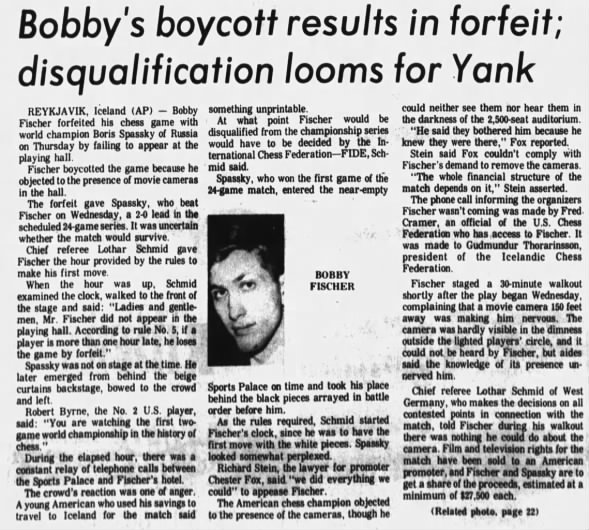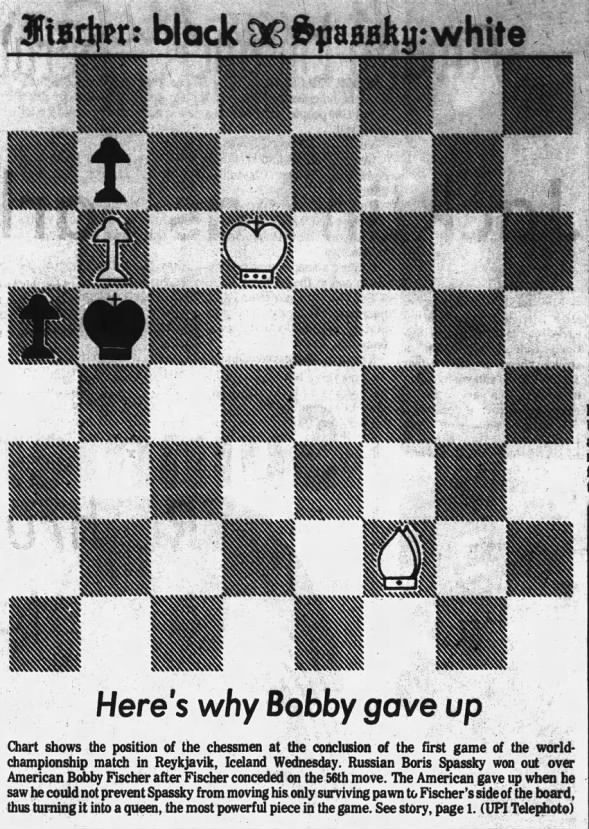Albany Democrat-Herald Albany, Oregon Thursday, July 13, 1972 - Page 1
Bobby's Boycott Results in Forfeit; Disqualification Looms for Yank
Reykjavik, Iceland (AP) — Bobby Fischer forfeited his chess game with world champion Boris Spassky of Russian on Thursday by failing to appear at the playing hall.
Fischer boycotted the game because he objected to the presence of movie cameras in the hall.
The forfeit gave Spassky, who beat Fischer on Wednesday, a 2-0 lead in the scheduled 24-game series. It was uncertain whether the match would survive.
Chief referee Lothar Schmid gave Fischer the hour provided by the rules to make his first move.
When the hour was up, Schmid examined the clock, walked to the front of the stage and said: “Ladies and gentlemen, Mr. Fischer did not appear in the playing hall. According to rule No. 5, if a player is more than one hour late, he loses the game by forfeit.”
Spassky was not on stage at the time. He later emerged from behind the beige curtains backstage, bowed to the crowd and left.
Robert Byrne, the No. 2 U.S. player, said: “You are watching the first two-game world championship in the history of chess.”
During the elapsed hour, there was a constant relay of telephone calls between the Sports Palace and Fischer's hotel.
The crowd's reaction was one of anger. A young American who used his savings to travel to Iceland for the match said something unprintable. ([He should blame the Soviets for selecting Iceland to bury the match, then, misled Fischer about the level of commotion that would be created by Chester Fox/Iceland/Soviet Union's camera operators who were placed there to distract Fischer and break his concentration]).
At what point Fischer would be disqualified from the championship series would have to be decided by the International Chess Federation—FIDE, Schmid said.
Spassky, who won the first game of the 24-game match, entered the near-empty Sports Palace on time and took his place behind the black pieces arrayed in battle order before him.
As the rules required, Schmid started Fischer's clock, since he was to have the first move with the white pieces. Spassky looked somewhat perplexed.
Richard Stein, the lawyer for promoter Chester Fox, said “we did everything we could” to appease Fischer. ([No you didn't. You were appeasing the Soviet Union who wanted a win by default, by using noisy and distractive camera operators. You could have used unmanned, automatic, stationery cameras, but refused, knowing you never had any intention to “appease” Fischer!])
The American chess champion objected to the presence of the cameras ([correction: the disruptive camera operators]), though he could neither see them nor hear them in the darkness of the 2,500-seat auditorium. ([Fischer firmly disagreed, as he reported seeing those camera-men moving all around in the auditorium. Why the deliberate attempt to confuse the readers. Fischer was directing his complaint at CAMERA MEN... not the cameras.])
“He said they bothered him because he knew they were there,” Fox reported ([and as Robert Fischer reported, he knew they were there because he could see them moving around in the auditorium. Rather unmistakable don't you think?])
Stein said Fix couldn't comply with Fischer's demand to remove the cameras.
“The whole financial structure of the match depends on it,” Stein asserted.
The phone call informing the organizers Fischer wasn't coming was made by Fred Cramer, an official of the U.S. Chess Federation who has access to Fischer. It was made to Gudmundur Thorarinsson, president of the Icelandic Chess Federation.
Fischer staged a 30-minute walkout shortly after the play began Wednesday, complaining that a movie camera 150 feet away was making him nervous. ([Again, why do you seek to confuse readers, Mr. Yellow Journalist? Fischer did not report the “camera” was the problem, but that humans were distracting him, he reported “they just had guys there with film cameras that were worrying, and they were all around me. Making a racket. A nuisance. Too much noise, and visually you could see them moving around.”]) The camera was hardly visible in the dimness outside the lighted players' circle ([but it was visible, wasn't it?]) and it could not be heard by Fischer ([but the human operating the camera, could be seen, Mr. Dishonest Journalist]), but aides said the knowledge of its presence unnerved him. ([No sir, Mr. Fischer was complaining about Camera Men, plural “crew,” which he could see moving around the auditorium, distracting him during play and upsetting his concentration. More specifically, the NY Times reported, “Fischer objected to a television CREW working from an aperture at the side of the stage. He said that the movements of one of the cameramen distracted him” which implies more than one camera operators in a given area of the auditorium… disrupting his concentration. Why does the journalist omit such crucial details to skew the report in favor of the Soviet Union? How much was the U.S.S.R. paying for these spin doctors to publish Soviet Union propaganda, while covering up their underhanded tricks to hold on to the title, by default?])
Chief referee Lothar Schmid of West Germany, who makes the decisions of all contested points in connection with the match, told Fischer during his walkout there was nothing he could do about the camera. Film and television rights for the match have been sold to an American promoter ([who is a closet USSR sympathizer/collaborator]), and Fischer and Spassky are to get a share of the proceeds, estimated at a minimum of $27,500 each.
 Bobby's Boycott Results in Forfeit; Disqualification Looms for Yank 13 Jul 1972, Thu Albany Democrat-Herald (Albany, Oregon) Newspapers.com
Bobby's Boycott Results in Forfeit; Disqualification Looms for Yank 13 Jul 1972, Thu Albany Democrat-Herald (Albany, Oregon) Newspapers.com
Here's Why Bobby Gave Up
Charts shows the position of the chessmen at the conclusion of the first game of the world-championship match in Reykajvik, Iceland Wednesday. Russian Boris Spassky won out over American Bobby Fischer after Fischer conceded on the 56th move. The American gave up when he saw he could not prevent Spassky from moving his only surviving pawn to Fischer's side of the board, thus turning it into a queen, the most powerful piece in the game. See story, page 1. (UPI Telephoto)
 Here's Why Bobby Gave Up 13 Jul 1972, Thu Albany Democrat-Herald (Albany, Oregon) Newspapers.com
Here's Why Bobby Gave Up 13 Jul 1972, Thu Albany Democrat-Herald (Albany, Oregon) Newspapers.com
























